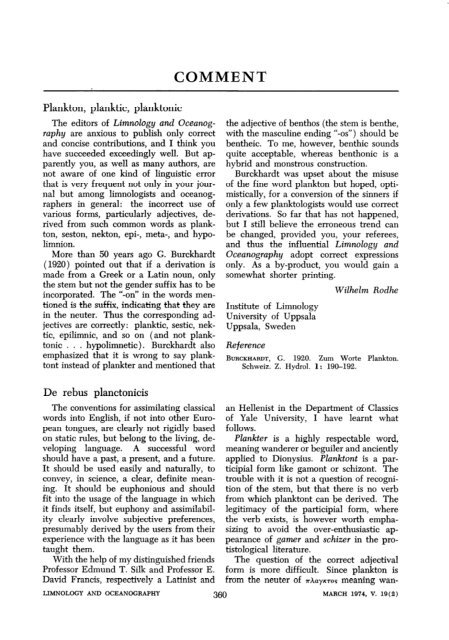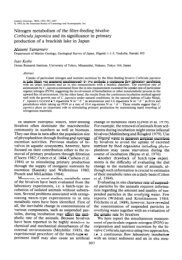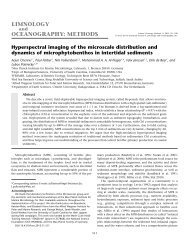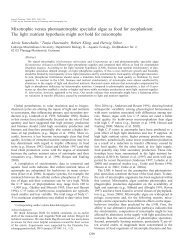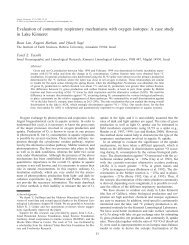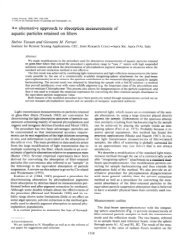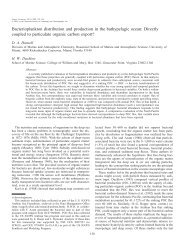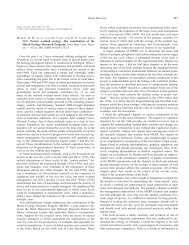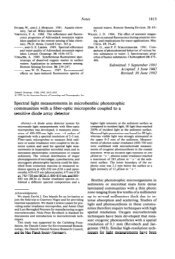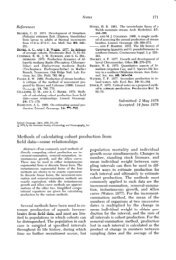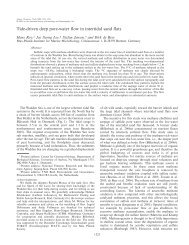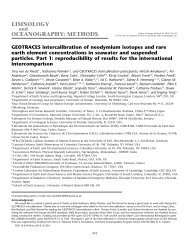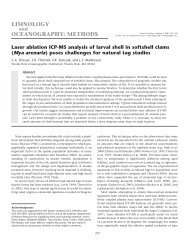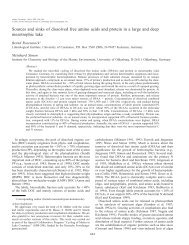De rebus planctonicis - ASLO
De rebus planctonicis - ASLO
De rebus planctonicis - ASLO
You also want an ePaper? Increase the reach of your titles
YUMPU automatically turns print PDFs into web optimized ePapers that Google loves.
Plankton, planktic, planktonic<br />
COMMENT<br />
The editors of Limnology and Oceanog-<br />
raphy are anxious to publish only correct<br />
and concise contributions, and I think you<br />
have succeeded exceedingly well. But ap-<br />
parently you, as well as many authors, are<br />
not aware of one kind of linguistic error<br />
that is very frequent not only in your jour-<br />
nal but among limnologists and oceanog-<br />
raphers in general: the incorrect use of<br />
various forms, particularly adjectives, de-<br />
rived from such common words as plank-<br />
ton, seston, nekton, epi-, meta-, and hypo-<br />
limnion.<br />
More than 50 years ago G. Burckhardt<br />
(1920) pointed out that if a derivation is<br />
made from a Greek or a Latin noun, only<br />
the stem but not the gender suffix has to be<br />
incorporated. The “-on” in the words men-<br />
tioned is the suffix, indicating that they are<br />
in the neuter. Thus the corresponding ad-<br />
jectives are correctly: planktic, sestic, nek-<br />
tic, epilimnic, and so on (and not plank-<br />
tonic . . . hypolimnetic) . Burckhardt also<br />
emphasized that it is wrong to say plank-<br />
tont instead of plankter and mentioned that<br />
<strong>De</strong> <strong>rebus</strong> <strong>planctonicis</strong><br />
The conventions for assimilating classical<br />
words into English, if not into other Euro-<br />
pean tongues, are clearly not rigidly based<br />
on static rules, but belong to the living, de-<br />
veloping language. A successful word<br />
should have a past, a present, and a future.<br />
It should be used easily and naturally, to<br />
convey, in science, a clear, definite mean-<br />
ing. It should be euphonious and should<br />
fit into the usage of the language in which<br />
it finds itself, but euphony and assimilabil-<br />
ity clearly involve subjective preferences,<br />
presumably derived by the users from their<br />
experience with the language as it has been<br />
taught them.<br />
With the help of my distinguished friends<br />
Professor Edmund T. Silk and Professor E.<br />
David Francis, respectively a Latinist and<br />
the adjective of benthos (the stem is benthe,<br />
with the masculine ending “-OS”) should be<br />
bentheic. To me, however, benthic sounds<br />
quite acceptable, whereas benthonic is a<br />
hybrid and monstrous construction.<br />
Burckhardt was upset about the misuse<br />
of the fine word plankton but hoped, opti-<br />
mistically, for a conversion of the sinners if<br />
only a few planktologists would use correct<br />
derivations. So far that has not happened,<br />
but I still believe the erroneous trend can<br />
be changed, provided you, your referees,<br />
and thus the influential Limnology and<br />
Oceanography adopt correct expressions<br />
only. As a by-product, you would gain a<br />
somewhat shorter printing.<br />
Institute of Limnology<br />
University of Uppsala<br />
Uppsala, Sweden<br />
Reference<br />
Wilhelm Rodhe<br />
BURCKHARDT, G. 1920. Zum Worte Plankton.<br />
Schweiz. Z. Hydrol. 1: 190-192.<br />
an Hellenist in the <strong>De</strong>partment of Classics<br />
of Yale University, I have learnt what<br />
follows.<br />
Hankter is a highly respectable word,<br />
meaning wanderer or beguiler and anciently<br />
applied to Dionysius. Planktont is a par-<br />
ticipial form like gamont or schizont. The<br />
trouble with it is not a question of recogni-<br />
tion of the stem, but that there is no verb<br />
from which planktont can be derived. The<br />
legitimacy of the participial form, where<br />
the verb exists, is however worth empha-<br />
sizing to avoid the over-enthusiastic ap-<br />
pearance of gamer and schixer in the pro-<br />
tistological literature.<br />
The question of the correct adjectival<br />
form is more difficult. Since plankton is<br />
from the neuter of rhayr
dering or roaming, used of ships in poetry,<br />
the word as we employ it started out as an<br />
adjective. Neither planktic nor planktonic<br />
therefore can have any ultimate authority<br />
in ancient Greek. We must however use<br />
one of them, since we have turned the<br />
original singular adjective into a collective<br />
noun.<br />
Planktic, with its terminal hard “c” com-<br />
ing so close to the identical sound of the<br />
“k,” is definitely less pleasant to me than<br />
is planktonic; the latter is the only form<br />
given in the Oxford English Dictionary,<br />
though it is described as an irregular for-<br />
mation for the hypothetical planktic. Since<br />
there is, to me, no compelling reason in<br />
favor of planktic on linguistic grounds, I<br />
shall continue to use planktonic solely as<br />
the more euphonious of the two. Speakers<br />
of other languages must clearly be left to<br />
decide whether they prefer plankton&h to<br />
plunktisch, planctonique to planctique,<br />
planctonico to plunctico, etc. I see no rea-<br />
son to insist on uniformity even within a<br />
language. It may be worth noting that if<br />
someone speaking colloquially in the labo-<br />
ratory referred to a collection just sub-<br />
mitted to him as looking phnktonish (the<br />
strict cognate of plunktonisch) it would<br />
sound natural and comprehensible; in these<br />
circumstances planktish would be meaning-<br />
less.<br />
Planctonicus sounds well as a Latin ad-<br />
jective and has often been used as a spe-<br />
cific name; even though its formation can<br />
have no classical authority, it seems to fit.<br />
Environmental control of phytoplankton cell size<br />
Comment 361<br />
The aesthetic objection to planktic does<br />
not apply to benthic, which is doubtless<br />
preferrable to benthonic. I should how-<br />
ever, be quite happy if we never got any-<br />
thing worse than the latter. We do, when-<br />
ever we run into biodegradable or any of<br />
the other horrid bigenerous words of un-<br />
kindly procreation with which the environ-<br />
mental crisis has polluted our language.<br />
But even such words may ultimately settle<br />
down, as has apricot, part Arabic, part<br />
Hellenized Latin, though filtered through<br />
the Portuguese.<br />
It is obviously impossible to impose strict<br />
consistency, particularly in derivatives of<br />
somewhat synthetic nouns such as plank-<br />
ton, or for that matter electron, a word<br />
which is an accidental reconstruction of the<br />
original Greek, but with quite a different<br />
meaning. I do not suppose that anyone has<br />
proposed an editorial policy requiring that<br />
electric should be systematically substituted<br />
for electronic.<br />
My position is that there is no need to<br />
enforce rigid rules if people will try to<br />
write clearly and with elegance. If they do<br />
not, little can be done, even with the strict-<br />
est precepts. Perhaps that ardent Pauline<br />
scholar, E. A. Birge, would have preferred<br />
“not of the letter, but of the spirit; for the<br />
letter killeth, but the spirit giveth life.”<br />
G. Evelyn Hutchinson<br />
Osborn Memorial Laboratories<br />
Yale University<br />
New Haven, Connecticut 06520.<br />
. , . occasionally, by raising our eyes from<br />
the immediate problems that confront us,<br />
we can achieve a partial synthesis which<br />
gives fresh direction to our enquiries.<br />
R. B. Clark<br />
Two apparently divergent views have argument emphasizing the role of hydro-<br />
recently been expressed concerning the en- dynamic forces in favoring the retention of<br />
vironmental control of phytoplankton cell large cells within the planktonic biotope.<br />
size in the oceans. Semina (1972) offers According to Semina mean cell size of a<br />
what can be characterized as a physical planktonic population is a result of 1) the


